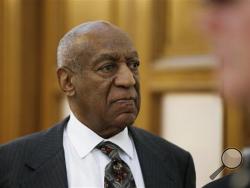NORRISTOWN, Pa. (AP) — Bill Cosby's lawyers will ask a Pennsylvania judge to either throw out his criminal sex assault case or let him face his accuser in court before trial.
Cosby is due back in court near Philadelphia on Thursday to appeal a judge's decision to send the case to trial. Cosby's lawyers insist a trial should not be held until accuser Andrea Constand testifies and they get a chance to cross-examine her. But prosecutors say a recent court ruling allowed them to use her police statement at the May preliminary hearing instead.
A lower court judge agreed, and upheld the charges.
Now the defense will ask the trial judge, Steven T. O'Neill, to reconsider the issue. O'Neill could set a trial date if he rules against the defense Thursday.
Cosby, 78, is charged with felony indecent assault for allegedly drugging and molesting Constand in 2004. Authorities reopened the case last year after learning he had acknowledged in a deposition that he had given Constand pills and then engaged in sex acts with her.
They also considered the dozens of other women who have raised similar claims in the decade since Constand went to police in 2005.
Cosby calls their encounter consensual and describes the blue pills he gave her as Benadryl. He said he sometimes took the same allergy medicine to help him fall asleep.
Prosecutors chose not to have Constand testify at the May preliminary hearing, citing a 2015 state Superior Court ruling that allows hearsay testimony at that stage to spare alleged victims from repeated court appearances. However, the state Supreme Court has agreed to review the decision, leading Cosby's lawyers to challenge it. The high court has not said when it will hear arguments on the issue.
Constand told police the drugs left her semi-conscious and unable to move. Her lawyers believe Cosby gave her something stronger than Benadryl.
Cosby also is fighting Constand and other accusers in civil court, where he has been sued for defamation — and has struck back with countersuits — over his denial of their sex assault claims.

